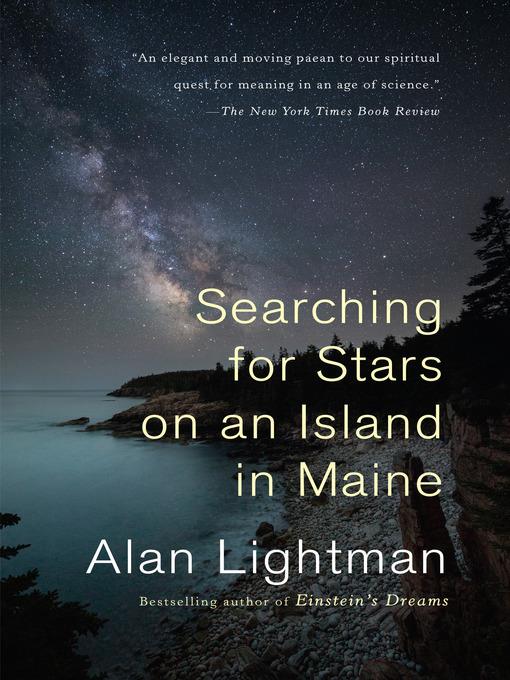
Searching for Stars on an Island in Maine
کتاب های مرتبط
- اطلاعات
- نقد و بررسی
- دیدگاه کاربران
نقد و بررسی

Starred review from December 11, 2017
Novelist and physicist Lightman (The Accidental Universe) mesmerizes in this collection of essays that explores the connections between scientific ideas and the wider world. He sets his stage neatly, with an evocative memory of gazing up at the starry night sky while in a little boat drifting near a small island off the coast of Maine. There he found himself “falling into infinity” as he gazed into the cosmos: “I felt a merging with something far larger than myself, a grand and eternal unity, a hint of something absolute.” Absolutes, Lightman writes, are comforting because they allow humans to “imagine perfection.” This idea echoes in essays that focus on such topics as ants, stars, death, and truth. Lightman discusses the big bang, prehistoric cave paintings, the nature of humanity, and more as he moves lithely from Galileo to van Gogh, Einstein to Emily Dickinson, and St. Augustine to Arctic explorer Robert Peary. More philosophy of science than hard science, this is a volume meant for savoring, for readerly ruminations, for thinking about and exploring one essay at a time. Lightman’s illuminating language and crisp imagery aim to ignite a sense of wonder in any reader who’s ever pondered the universe, our world, and the nature of human consciousness. Agents: Jane Gelfman and Deborah Schneider, ICM Partners.

January 1, 2018
One of our most reliable interpreters of science offers a slender book of ruminations that venture wide and deep.Theoretical physicist Lightman (Practice of the Humanities/MIT; Screening Room, 2015, etc.) rarely ponders a scientific principle or development without considering its significance in human terms, an approach that is very much in the tradition of Lewis Thomas. Lightman focuses on the logical and mathematical underpinnings of the material world as it relates to concepts of "reality" and to spirituality broadly defined. Throughout, the author makes his points clearly. Discussing the finality of death vs. notions of immortality, for example, he writes, "I accept that science and the scientific view of the world may not encompass all of existence....Still, I ask for some kind of evidence for all things I believe." So remarkable is the material world we experience, the author suggests, that humans persist in finding supernatural explanations for its wonders. Lightman also acknowledges that while "the materiality of the world is a fact...facts [alone] don't explain the experience." To him, after millennia of philosophical and theological speculation, the most profound questions about the origins of the universe may open themselves to science or may have no answers that seem possible. Lightman makes cogent, generally unassailable arguments, provided readers share his basic precepts. He weighs in on free will vs. determinism, the vitalistic vs. mechanistic concepts of human life, the multiverse, the grandeur of consciousness, and the illusion of "self." A leitmotif of the book is humanity's innate desire for absolutes, even though few exist in a relative world. Lightman locates those that do in science and philosophy rather than religion.From Newton and Galileo to Einstein and Aristotle, from St. Augustine and the Buddha to contemporary theological thought, Lightman presents a distilled but comprehensive survey of the search for meaning, or the lack thereof, in our longing to be part of the infinite.
COPYRIGHT(2018) Kirkus Reviews, ALL RIGHTS RESERVED.

February 15, 2018
Physicist, award-winning essayist, best-selling author, and current MIT humanities professor, Lightman (The Accidental Universe) contemplates the universe and the view from his vacation home in Maine. He weaves the writings of poets, scientists, and religious scholars as he explores the boundaries of the known (and unknown) world. As he looks to the future, he considers technology's role in the evolution and understanding of human nature. In particular, Lightman considers the debate between mechanists and vitalists, and between free will and determinism. He also compares Saint Augustine's writings on certainty to recent research on neural networks, as well as Isaac Newton's clockwork universe to modern quantum mechanics, connecting past modes of thinking to the present. Lightman's artful and questioning narrative style easily conveys complex concepts from physics to philosophy. VERDICT Recommended for serious but also curious nonfiction readers who enjoy the interplay of big ideas and theories. Both believers and nonbelievers will find much to ponder in this discussion of science and religion, which reads like a soothing meditation.--Catherine Lantz, Univ. of Illinois at Chicago Lib.
Copyright 2018 Library Journal, LLC Used with permission.

March 15, 2018
Physicist-novelist Lightman (Screening Room, 2015) strives to, if not reconcile, at least put religion and science on good speaking terms. These personal and historical essays on religion, science, and religion-and-science are assembled to draw the reader ever deeper in. In the first piece, Lightman writes from that island in Maine, where he regularly summers and where he had an apprehension of transcendental reality that he likens to great religious figures' moments of enlightenment. It made him appreciate the big-A Absolutes that religion upholds and to which science counterposes the relativistic material world. Yet science has a Central Doctrine, he says, that physical laws govern all properties and events in the universe. Scientific laws are always provisional, though, as longer pieces on Stars, Atoms, Motion, Origins, and the Multiverse demonstrate. If the Central Doctrine requires a faith akin to what religion demands, the details clearly don't. Between the history-of-science essays, Lightman goes back to the island or off to consult Buddhists about Truth and listen to Einstein and Hindu poet Rabindrinath Tagore discuss Transcendence. An illuminating, deeply human book.(Reprinted with permission of Booklist, copyright 2018, American Library Association.)

























دیدگاه کاربران